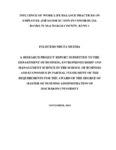Influence of work life balance practices on employee job satisfaction in commercial banks in Machakos county, Kenya
Abstract
Work-Life balance among employees has emerged as an issue of concern to both employees and employers. There has been growing attention to employees’ inability to dedicate proper attention and time to one’s non-work activities and obligations which often leads to dissatisfaction with their job. The main objective of this study was to examine Work -Life Balance practices influencing employee job satisfaction in Commercial Banks in Machakos County. The study specifically explored the influence of Work Life Balance practices relating to time, place and employee benefits on employee job satisfaction. A descriptive survey research design was used to gather quantitative and qualitative data from employees in the sixteen banks with a target population of three hundred and eighty (380). Stratified random sampling technique was used to select a sample size of one hundred and ninety-one (191) respondents. The researcher used structured questionnaires to collect data. Questionnaires were administered to the selected employees of all cadre in the commercial banks. Data collected was analysed using the Statistical Package for Social Science (SPSS). Inferential statistics, that is, regression and the Pearson Correlation Coefficient were used to analyse the relationships between the study variables. The relationship between Work Life Balance practices relating to time, place and employee benefits was found to be 0.475,0.306 and 0.463 respectively. This indicated a strong relationship between practices relating to time and employee benefits on employee job satisfaction, and a moderate one on practices relating to place. The study established that flexibility of working time and minimum pressure for time enabled employees to comfortably balance between their working life and family life. The study also established that the use of modern technology enabled employees carry out certain tasks from alternative locations which helped reduce commute-related stress. Employees were found to enjoy various employment benefits which enhanced their psychological well being and consequently, their satisfaction with their job. Based on these findings, the researcher recommended that banks improve on flexible working arrangements, adopt telecommuting arrangements and consider giving benefits like on-site childcare and longer leaves that help rejuvenate employees.
Collections
- MKSU Masters Theses [146]

